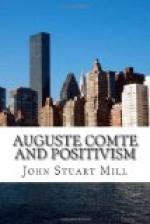The explanation of this we find in an original mental twist, very common in French thinkers, and by which M. Comte was distinguished beyond them all. He could not dispense with what he called “unity.” It was for the sake of Unity that a religion was, in his eyes, desirable. Not in the mere sense of Unanimity, but in a far wider one. A religion must be something by which to “systematize” human life. His definition of it, in the “Catechisme,” is “the state of complete unity which distinguishes our existence, at once personal and social, when all its parts, both moral and physical, converge habitually to a common destination.... Such a harmony, individual and collective, being incapable of complete realization in an existence so complicated as ours, this definition of religion characterizes the immovable type towards which tends more and more the aggregate of human efforts. Our happiness and our merit consist especially in approaching as near as possible to this unity, of which the gradual increase constitutes the best measure of real improvement, personal or social.” To this theme he continually returns, and argues that this unity or harmony among all the elements of our life is not consistent with the predominance of the personal propensities, since these drag us in different directions; it can only result from the subordination of them all to the social icelings, which may be made to act in a uniform direction by a common system of convictions, and which differ from the personal inclinations in this, that we all naturally encourage them in one another, while, on the contrary, social life is a perpetual restraint upon the selfish propensities.




